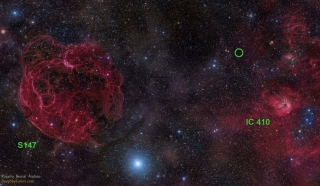搜索结果: 1-15 共查到“天文学 Discovery”相关记录45条 . 查询时间(0.093 秒)

Magnetic-Field Discovery Gives Clues to Galaxy-Formation Processes(图)
Magnetic-Field Gives Clues Galaxy-Formation
2015/7/13
Astronomers making a detailed, multi-telescope study of a nearby galaxy have discovered a magnetic field coiled around the galaxy's main spiral arm. The discovery, they said, helps explain how galacti...
Astronomers join forces to speed discovery of habitable worlds
Astronomers speed discovery habitable worlds
2015/4/30
UC Berkeley astronomers will lead one of 16 new projects funded by NASA to coordinate different exoplanet searches to more efficiently find habitable planets around other stars, and perhaps extraterre...
Discovery of a 136 Millisecond Radio and X-Ray Pulsar in Supernova Remnant G54.1+0.3
G54.1+0.3 PSR J1930+1852
2014/12/26
We report the discovery of a pulsar with period P = 136 ms and dispersion measure 308 cm-3 pc in a deep observation of the supernova remnant (SNR) G54.1+0.3 with the Arecibo radio telescope. Timing me...
Discovery of a Molecular Outflow in the Haro 6-10 Star-forming Region
clouds jets and outfl ows
2014/12/23
We present high sensitivity 12CO and 13CO J=1!0 molecular line maps covering the full extent of the parsec scale Haro 6-10 Herbig-Haro (HH) flow. We report the discovery of a molecular CO outflow alon...
DISCOVERY OF A LUMINOUS BLUE VARIABLE WITH AN EJECTION NEBULA NEAR THE QUINTUPLET CLUSTER
variable star Pistol Star
2014/12/22
We report on the discovery of a luminous blue variable (LBV) lying 7 pc in projection from the Quintuplet cluster. This source, which we call LBV G0.120 – 0.048, was selected for spectroscopy owing to...
A SEARCH FOR RADIO PULSARS IN THE NORTHERN SKY: DISCOVERY OF A PULSAR IN A UNIQUE BINARY SYSTEM
Search Radio pulsar The sky The pulsar. A binary system
2014/12/10
A sensitive search for pulsars has been conducted using the 92-meter transit telescope of the National Radio Astronomy Observatory. Nearly 50% of the sky north of +20(DEGREES) declination was searched...

Radio-burst discovery deepens astrophysics mystery(图)
Pulse Celestial bodies The Milky Way. The radio waves. Radio telescopes A quick radio burst Astrophysics
2014/7/18
Brief pulse detected by Arecibo telescope appears to come from far beyond our galaxy.The discovery of a split-second burst of radio waves by scientists using the Arecibo radio telescope in Puerto Rico...

Discovery Expands Search for Earthlike Planets( 图)
A binary system Astronomy The sun The moon Orbit The Milky Way
2014/7/18
COLUMBUS, Ohio—A newly discovered planet in a binary star system located 3,000 light-years from Earth is expanding astronomers’ notions of where Earth-like—and even potentially habitable—planets can f...
Discovery of the neutron star spin and orbital period from the Be/X-ray binary IGR J05414-6858 in the LMC
Discovery neutron star spin orbital the Be/X-ray binary IGR J05414-6858 the LMC
2012/2/23
The number of known Be/X-ray binaries in the Large Magellanic Cloud is small compared to the observed population of the Galaxy or the Small Magellanic Cloud. The discovery of a system in outburst prov...
Discovery of the correspondence between intra-cluster radio emission and a high pressure region detected through the Sunyaev-Zel'dovich effect
galaxies: clusters: individual: RX J1347-1145 – radio continuum: galaxies – X-rays: galaxies: clusters – cosmic back- ground radiation
2011/10/18
We analyzed new 237 MHz and 614 MHz GMRT data of the most X-ray luminous galaxy cluster, RX J1347-1145. Our radio results are compared with the MUSTANG 90 GHz Sunyaev-Zel'dovich effect map and with re...
The hot-Jupiter Kepler-17b: discovery, obliquity from stroboscopic starspots, and atmospheric characterization
hot-Jupiter Kepler-17b discovery stroboscopic starspots atmospheric characterization
2011/10/20
This paper reports the discovery and characterization of the transiting hot giant exoplanet Kepler-17b. The planet has an orbital period of 1.486 days, and radial velocity measurements from the Hobby-...
Pan-STARRS1 Discovery of Two Ultra-Luminous Supernovae at z ~ 0.9
Pan-STARRS1 Discovery Ultra-Luminous Supernovae z ~ 0.9
2011/10/11
We present the discovery of two ultra-luminous supernovae (SNe) at z ~ 0.9 with the Pan-STARRS1 Medium-Deep Survey. These SNe, PS1-10ky and PS1-10awh, are amongst the most luminous SNe ever discovered...
Swift J2058.4+0516: Discovery of a Possible Second Relativistic Tidal Disruption Flare
Swift Possible Second Relativistic idal Disruption Flare
2011/10/17
We report the discovery by the Swift hard X-ray monitor of the transient source Swift J2058.4+0516 (Sw J2058+05). Our multi-wavelength follow-up campaign uncovered a long-lived (duration >~ months), l...
IceCube as a discovery observatory for physics beyond the standard model
IceCube as a discovery observatory for physics beyond the standard model
2011/10/14
Construction of the cubic-kilometer neutrino detector IceCube at the South Pole has been completed in December 2010. It forms a lattice of 5160 photomultiplier tubes monitoring a gigaton of the deep A...
Discovery of a stripped red giant core in a bright eclipsing binary system
binaries: spectroscopic – binaries: individual: KOI-81 – stars: individual 1SWASP J024743.37− 251549.2
2011/10/19
We have identified a star in the WASP archive photometry with an unusual lightcurve due to the total eclipse of a small, hot star by an apparently normal A-type star and with an orbital period of only...

